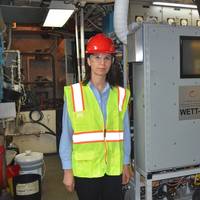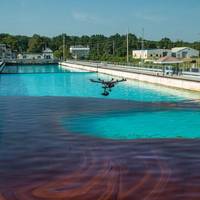Water Treatment: Inside WETT Technology for Oily and Black Water Treatment on Ships

Attracted by the environmental mission of Terragon Environmental Technologies, Dr. Ramona Pristavita, Terragon’s Vice President of Engineering, discusses the operational advances and advantages that Wastewater Electrochemical Treatment Technology (WETT) offers to shipowners.Handling a variety of shipboard waste water efficiently, effectively, is a central tenant to ship operations.Operating in the harsh saltwater environment, with a broad spectrum of ship movements and vibrations…
New Oil Spill Tech Solutions Put to the Test

No two oil spill response operations are the same. Each can present new and even tougher challenges for spill responders as they detect, contain and recover spilled oil. Diverse aspects affecting oil spill response operations can be the physical environment, spill monitoring, use of chemical dispersants, and the availability of proper technology for the situation.Some challenges have been met through research and technology development of techniques for dealing with spills. However…
Ensolve Earns Type Approval
EnSolve Biosystems announced that it has received U.S. Coast Guard and International Maritime Organization (IMO) type approval for its new PetroLiminator® 100 Oil Water Separator. The PetroLiminator 100 uses a patented biotechnology process to remove oil and other hydrocarbon wastes from ships’ bilge water, so it can be safely discharged overboard in environmentally sensitive waters. The system contains safe, non-pathogenic bacteria that actually “eat” the oil, grease, transmission fluid and other hydrocarbons in the bilge water. The U.S. Coast Guard type approval certifies that the system meets U.S. and international clean-water regulatory standards for overboard discharge.
Spill Secured in Bayou Perot
In the multi agency response and investigation surrounding a spill of medium crude from a damaged wellhead in Bayou Perot, La., the Coast Guard reported that the discharge was stopped and the well was secured. To date 49,000 ft. of oil containment boom have been deployed and more than 61,000 gallons of emulsified oil and water waste have been collected. The operator of the well, ExPert Oil & Gas, continues to offer a $35,000 reward for information directly resulting in the identification (as determined by the operator) of the person or persons responsible for damaging the wellhead. The oil spill was discovered during the early morning hours 1/21/07 near mile marker 20 of the Gulf Intracoastal Waterway.
Ensolve to Supply PetroLiminator for Reserve Fleet
EnSolve’s PetroLiminator System Uses Patented Bioremediation Technology to Remove Emulsified Oil EnSolve Biosystems has been awarded a contract from the U.S. Maritime Administration (MARAD) to supply a PetroLiminator Oil Water Separator for treating bilge water from its fleet service craft at the Suisun Bay Reserve Fleet, Calif. The patented PetroLiminator system uses a three-stage process to treat the oily water. In the first stage, free-phase oil is separated and removed to a collection tank, where it can be recycled or burned. In Stage II, the oily water passes through a bioremediation chamber containing hydrocarbon-degrading microbes, which consume the emulsified oil droplets.
Vancouver Shipyards Solves the Oily Wastewater Problem
By Rob Stephenson and Bruce Tennant, McKay Creek Tech.; and Don Hartle and George Geatros Vancouver Shipyards Co. Ltd. Vancouver Shipyards is part of the Washington Marine Group, the largest shipbuilding, ship maintenance and repair, and marine transportation company in Canada. Inherent to this scale of operation, the Washington Marine Group generates large quantities of emulsified oily wastewater. Managing the oily bilge water, ballast water, fuel/slop tanks, tank wash water from gas freeing operations, and wastewater from pressure washing machinery was becoming a big and expensive problem at Vancouver Shipyards. Both salt and fresh wastewaters are contaminated with emulsified oil and grease…
WSF Cuts Costs With Oily Water Separator Refit
Washington State Ferries, a company that operates on routes with tremendous environmental concern and legislation, recently refit one of its ferries, Nisqually, with a bio-enhanced Oil Water Separator solution from ECP Service Corp. The Washington State Department of Transportation operates one of the largest passenger and automobile ferry services in the world, with 29 vessels capable of generating between 2,000 to 3,000 gallons of oil water in the vessels' bilge each month. The company sought a solution that would reduce or eliminate disposal cost, improve oily water separator efficiency and create a more environmentally responsible operation.









